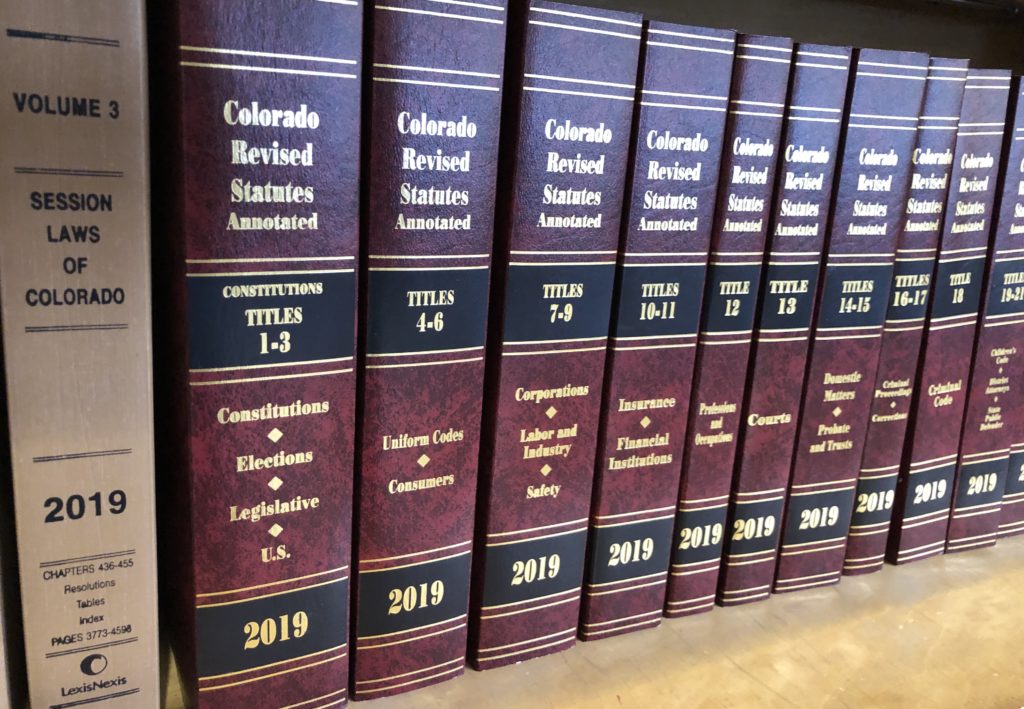By Jeffrey A. Roberts
CFOIC Executive Director
State lawmakers Thursday evening voted down a bill to allow civil lawsuits in state courts against Colorado governments for violations of rights enumerated in the Colorado Constitution, including free speech and a free press.
Two Democratic members of the House Judiciary Committee, including chairman Mike Weissman, D-Aurora, sided with Republican members to defeat House Bill 20-1287 after the measure’s sponsor, Rep. Matt Soper, had requested it be killed.
“This is a really big bill. It’s not a small bill,” said Soper, a Delta Republican, at the start of a hearing that lasted more than five hours and featured a long procedural fight. “It’s a major change in the way we do business in Colorado, and it certainly requires a much longer runway in terms of stakeholder work ahead of us.”

Called the Colorado Rights Act, the proposal would have allowed anyone whose Colorado constitutional rights are infringed upon to bring a civil action in state court and receive reasonable attorney fees and court costs upon prevailing. It would have prohibited governments from defending against such suits by using qualified immunity, a legal doctrine that shields government officials from being sued for actions performed in their official capacity unless they violated clearly established law or constitutional rights.
“Unlike ordinary citizens who are expected to know the law, public officials are permitted to escape liability when they are reasonably mistaken about whether their conduct violates the Constitution,” testified Alan Chen, a constitutional law professor at the University of Denver. “Qualified immunity results in extreme unfairness to plaintiffs who frequently go uncompensated even when courts acknowledge that their constitutional rights have been violated.”
Because qualified immunity has undermined the enforcement of rights in the U.S. Constitution, proponents of HB 20-1287 said there should be a way to enforce the list of rights in the state constitution.
“Without the Colorado Rights Act, the Colorado Constitution is nothing more than a piece of paper on a shelf gathering dust for most Colorado residents,” said Andy McNulty, a Denver civil rights attorney. Most Coloradans, he testified, can’t afford to pay an attorney to fight violations of their state constitutional rights.
The declaration of free speech and free press rights in Article II, Section 10, of the Colorado Constitution is stronger than in the First Amendment. It says: “No law shall be passed impairing the freedom of speech; every person shall be free to speak, write or publish whatever he will on any subject, being responsible for all abuse of that liberty; and in all suits and prosecutions for libel the truth thereof may be given in evidence, and the jury, under the direction of the court, shall determine the law and the fact.”
Media attorney Tom Kelley testified in favor of HB 20-1287 for the Colorado Freedom of Information Coalition and the Colorado Press Association. Kelley, past president of CFOIC and a current board member, cited a 1982 Colorado Supreme Court ruling that relied on the Colorado Constitution to uphold The Denver Post’s victory in a libel suit.
“The bottom line is that when we seek to vindicate rights of free speech and press in Colorado, the Colorado Constitution and not the First Amendment gives us our first shot,” Kelley said.
Colorado Independent Editor Susan Greene eventually settled with Denver’s police department for handcuffing and detaining her while she took pictures of officers in 2018. If the Colorado Rights Act had been in effect, she could have brought a civil claim under the Colorado Constitution, her lawyer, Mari Newman, told CFOIC.
“Susan’s case is a perfect example of a case that would be stronger under the Colorado Constitution, because of our Colorado values, than it would have been under the federal Constitution,” Newman said.
She cited the Colorado Constitution’s free press and free speech protections as well as its “equality of the sexes” provision. During the handcuffing incident, a Denver police officer told Greene to “act like a lady.”
Opponents of HB 20-1287 said it would lead to a flurry of costly lawsuits against governments in Colorado.
“It potentially opens up a lot wider variety of claims on more different things,” testified David Broadwell, general counsel for the Colorado Municipal League. “Famously, the U.S. Bill of Rights is 10 sections. Our Colorado Bill of Rights is 30 sections and covers a lot more detail than is covered under federal law. So how the new damages remedy and attorney fee remedy would be applied, with all the detail … in the Colorado Constitution, creates a massive unknown.”
Follow the Colorado Freedom of Information Coalition on Twitter @CoFOIC. Like CFOIC’s Facebook page. Do you appreciate the information and resources provided by CFOIC? Please consider making a tax-deductible donation.




